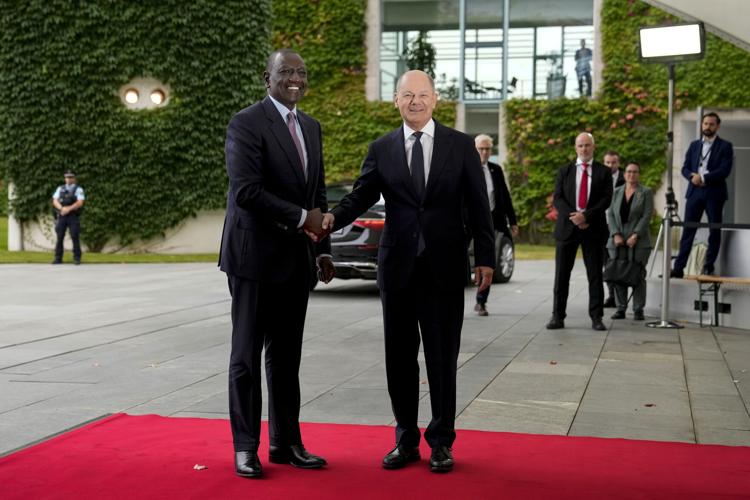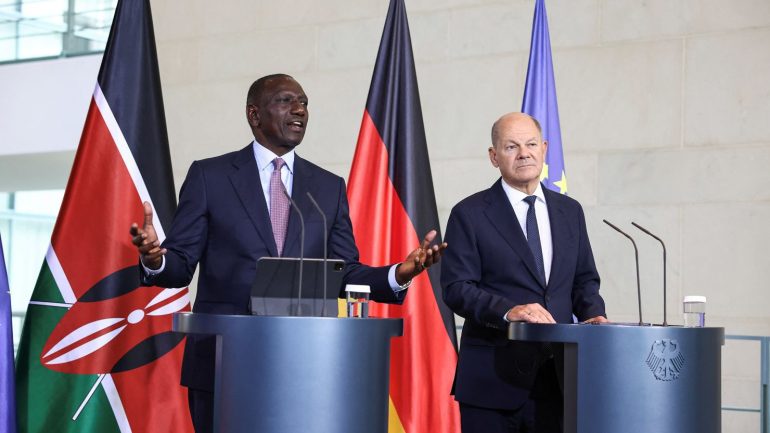Listeners:
Top listeners:
-
play_arrow
Bamba Radio Top Music Radio
-
 play_arrow
play_arrow
The HighLife Podcast Yana Bolder
German labor agreement opens doors for thousands of Kenyan laborers.


Germany’s Chancellor Olaf Scholz (R) and Kenya’s President William Ruto signed the deal in Berlin
Germany has committed to a regulated and targeted labor migration agreement that will allow 250,000 qualified and semi-skilled Kenyan workers entry.
Germany is experiencing a scarcity of skilled labor, while Kenya is having more and more trouble finding young professionals with jobs and enough money to support them.
As part of an experimental effort, Flensburg, in northern Germany, has already welcomed five bus drivers from Kenya.
The cornerstone of the German government’s efforts to reduce immigration is migration agreements.
Additionally, the accord will make it easier for Kenyans living in Germany without authorization to return home.
Additionally, the accord will make it easier for Kenyans living in Germany without authorization to return home.
Due to the surge in popularity of the far-right anti-immigration party Alternative for Germany (AfD), immigration is currently a major topic in Germany.
In recent years, a comparatively substantial number of asylum seekers have been allowed to settle in Berlin by successive governments.
During the 2015–2016 migration crisis, Germany took in over a million individuals, the most of whom were escaping war in places like Syria. Since Russia’s full-scale invasion started in February 2022, Germany has also taken in 1.2 million Ukrainian refugees.
- Germany to tighten border controls after stabbing
- Kenya doctor strike: The public caught between the medics and the government
William Ruto, the president of Kenya, and Olaf Scholz, the chancellor of Germany, signed the labor agreement in Berlin.
In order to facilitate Kenyans’ employment in the largest economy in Europe, Germany consented to relax several of its immigration regulations.
Berlin authorities are also contemplating granting temporary residency permits to Kenyan laborers who have been granted employment approval.
Long-term visas for Kenyans to study or pursue vocational training in Germany will also be granted.
“On the expiry of the long-stay visa, Kenyans may receive a temporary residence permit for study purposes in Germany for up to two years,” the agreement states.
It further states that if the goal of residency has not yet been fulfilled but can be within a “reasonable” amount of time, the temporary residence permit may be renewed.
As per the agreement, IT professionals from Kenya who lack official degrees would be permitted to work in Germany.
As long as the other party’s competent authorities recognize the qualifications of qualified workers who have completed their university education or vocational training, both governments will promote their immigration.

The European country needs more nurses but critics say it should not deprive Kenya of much-needed medical professionals
The agreement also covers the readmission and repatriation of citizens between the two countries.
It lays out policies for stopping and combating forced labor, human trafficking, and labor exploitation.
Claus Ruhe Madsen, the transport minister for Schleswig-Holstein, stated that Germany needed bright brains and hardworking hands as he welcomed five drivers from Kenya on Thursday in Flensburg.
“We simply have to position ourselves in Germany in such a way that it is attractive to come here,” Mr Madsen added.
The drivers are the first group of Kenyan laborers to be taught in a trial program by the Aktiv bus firm in the hopes of obtaining employment in Germany.
Teachers, doctors, and nurses are a few of the professionals anticipated to participate in the program.
According to the International Labour Organization (ILO), the agreement is anticipated to alleviate Germany’s labor shortages and greatly expand Kenyan workers’ access to respectable overseas employment.
“It includes mechanisms to protect the rights and welfare of Kenyan migrant workers in Germany, ensuring safe, orderly, and productive migration,” ILO added in a statement.
But there are concerns about a brain-drain in Kenya with professionals like doctors and nurses going abroad for jobs, leaving local hospitals with a huge shortage of medical workers.
“It is sad that we are going to service other countries at the expense of our own country,” Ekuru Aukot, a Kenyan lawyer and politician, told the BBC’s Newsday programme.
But Roseline Njogu, a senior foreign affairs official, said Kenya was simply responding to the global labour market demands.
“We have a youth bulge in Kenya and every year we have a million people joining the local labour market. It takes time and resources to create job opportunities at home,” she added.
Written by: pradm
Similar posts
Tottenham 4-3 Man Utd: Spurs advance to the Carabao Cup semifinals.
todayDecember 20, 2024 16 4
Recent Posts
- Manchester United’s Struggles Deepen After 3-0 Defeat to Bournemouth
- Liverpool’s Festive Fireworks: A 6-3 Triumph Over Tottenham
- Tottenham 4-3 Man Utd: Spurs advance to the Carabao Cup semifinals.
- 100 women killed in four months in Kenya
- The AMG Foundation opens its biggest library to date in Nanyuki.
Recent Comments
No comments to show.Featured post

Latest posts

Manchester United’s Struggles Deepen After 3-0 Defeat to Bournemouth

Liverpool’s Festive Fireworks: A 6-3 Triumph Over Tottenham

Tottenham 4-3 Man Utd: Spurs advance to the Carabao Cup semifinals.

100 women killed in four months in Kenya

The AMG Foundation opens its biggest library to date in Nanyuki.
Current show
Upcoming shows

The BeeHype Show
Presented by MC VBox
13:00 - 16:00
The Jam Drive
Presented by Kushite
17:00 - 20:00
Caffeine Mornings
Presented by Wanji The Songbird
07:00 - 10:00
The BeeHype Show
Presented by MC VBox
13:00 - 16:00
The Jam Drive
Presented by Kushite
17:00 - 20:00Chart
Copyright ©2024. All Rights Reserved









Post comments (0)